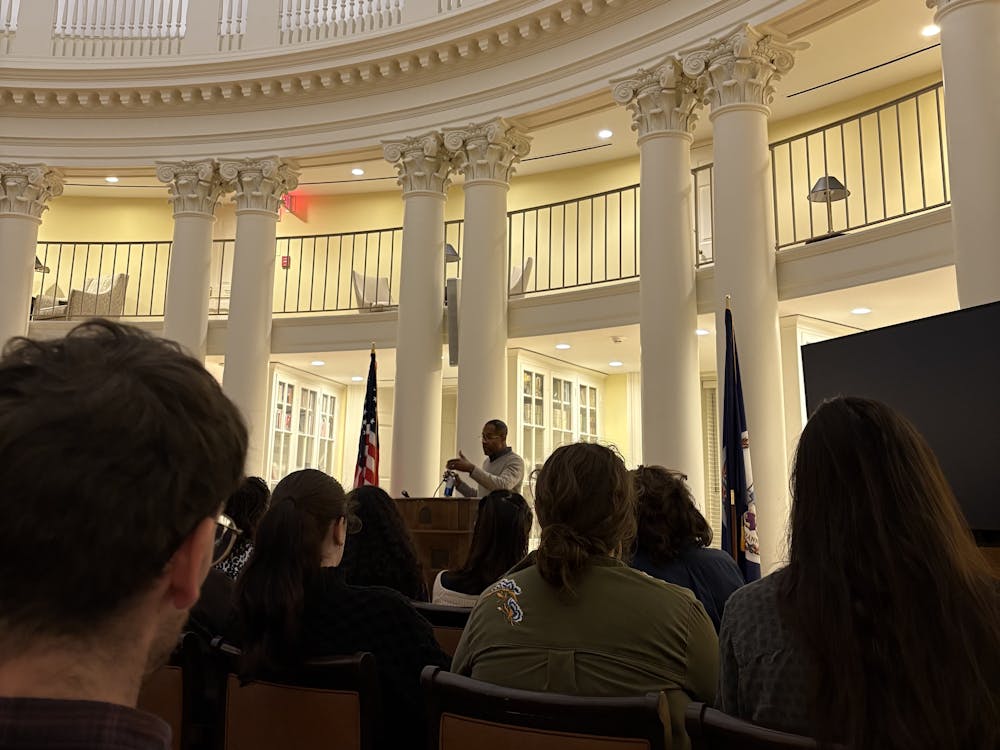Gregory Pardlo, Pulitzer Prize-winning poet, writer and professor came to the Rotunda for an evening poetry reading Thursday. Students, professors and locals gathered to hear him read from his book “Spectral Evidence” alongside selections from other collections.
Pardlo is known for his unconventional lyric form and keen ability to move from intimate narratives to philosophical meditations, while blending art, science, history, faith and the human experience into poetry. He traces his literary beginnings to a simple frustration — unable to produce what his mother, a visual artist, could, he found himself describing the images in his head with words, then asking his mother to draw them for him.
Since then, Pardlo has published four original books and countless poems, received the 2015 Pulitzer Prize in Poetry and was awarded a Guggenheim Fellowship, among other accolades. Pardlo now resides in Abu Dhabi, where he serves as the program head of New York University Abu Dhabi’s Literature and Creative Writing Program.
As the sun began to set on the evening, Pardlo opened the reading with selections from his latest works, aimed at exploring a maximalist aesthetic.
The first passage opened with the line, “Afro-pessimism is not a euphemism for a bad hair day.” The poem touched on epigenetics — the study of how behaviors and environment affect genes. Pardlo explored this concept in relation to the intergenerational trauma of African Americans and
Pardlo went on to introduce his book “Spectral Evidence,” a collection of poems meditating on Blackness, beauty, faith and the force of law. “Spectral Evidence” probes these ideas both in its content and its gothic, witchy tone. The concept of spectral evidence — a type of dream-driven testimony admitted in the Salem witch trials — and the form it takes today was noted, particularly in the judicial system, where quick, misguided decisions rooted in delusion often cost lives.
Pardlo then read several poems from this collection. He began with six poems from the eight-part “The Essay on Faith” sequence — “Exordium,” "Narratio," “Confirmatio,” “Confutation,” “Digression” and “Peroratio.” These poems dealt with both intimate personal memory as well as history to explore larger ideas of faith, evidence and perception.
He went on to share additional poems “Nunsploitation,” “Theater Selfie,” “Metaphor” and “Convertible,” all of which covered impactful subjects from art to family to race.
The reading session concluded with excerpts from “The Essay on Fidelity,” a collection of poems dealing with people, truth and memory, and was punctuated with a question to the audience: “In the spirit of geeking out, what did you think?”
Jack Grimes, second-year Master of Fine Arts student, reflected on Pardlo’s remarkable capabilities and range as a writer.
Grimes explained how even with the wide ranges of subjects Pardlo works with, including ekphrasis, art, science and religion, he is simultaneously able to incorporate messaging on histories of violence, American consumerism and racism.
“Blending all of this together, and being able to put them together on one page, and working with all of them so succinctly but also thoroughly and beautifully, is really impressive,” Grimes said.
A series of other reactions and questions from the audience were shared and the Dome Room hummed with a resonant murmur as Pardlo delivered his final insights, the past words of the hour still hanging in the air.
“He's emblematic of a poet's poet,” Grimes said. “Someone writing for the thrill of writing and engaging … we're all here to care about writing, and he's trying to pull us into this world he has.”







